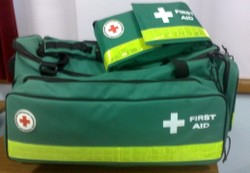Let us consider our laws and regulations as rules of a game, or a sport. With each rule changing due to injuries and deaths. Let's have a conversation about how that reactive environment, while it can help prevent further death and injury, is not the best at preventing the deaths and injuries in the first place.

Safety the blood sport
by Fargy
Safety evolves not only in our personal lives and experiences but in our societal structures. Our rules of the game as it were. Each rule is paid for in blood.
Sherlock Holmes in a pea-souper.
Sherlock Holmes striding the streets of London, the mysterious fogs of the city swirling about him as he stalks killers in the cold night.
In 1952 the fog was the killer.
The "Great Smog" of December 1952 killed some 4000 Londoners nigh on immediately and another 8000 over the ensuing weeks.
It led to the Clean Air Act 1956.
Which was preceded by the;
Public Health (London) Act 1891
Smoke Nuisance Abatement (Metropolis) Acts, 1853 and 1856
Which basically means smog was killing Londoners for 100 years.
Those that died paved the way for legislative changes and to an ongoing improvement in the discussion and control of these issues. In London.
Blood money.
Safety is always seen as a cost.
This is because it is easy to measure a pile of bodies, but not so easy to measure no dead people.
If Safety works it's seen as unmeasureable, and how do you manage what you cannot measure?
The London fog issue happens everywhere.
We put up traffic lights when someone dies at an intersection.
We wring our hands when a 1000 people in Bangladesh die because we like to buy cheap clothing as long as we don't see the workers who make the clothing. They are in the fog of distance in a foreign country.
Bangladesh is going through the same ructions now as London did in 1952.
The Govt. of London did not want to change the laws on clean air, because of money. Backbenchers had to get the ball rolling.
In Bangladesh the same seems to be happening. Here is an article on how the people of Bangladesh are organising themselves.
http://www.huffingtonpost.com/2013/09/23/bangladesh-workers-protest_n_3974470.html
This organisation will lead to less dehumanization of these people.
It shows how blind some people can be that even when they breathe the same polluted air that is killing people, they still value money highly. That even when a building collapses into a mass grave in their city that there still has to be debate over whether that is a good or bad thing.
If you work in Safety areas, you will replay these issues. So prepare to argue how Safety now is better than gambling on paying lawyers later.
There is always a cost for being ridiculously unsafe. What people do is gamble and hope they don't get caught with the bill, which usually means we all get caught with the bill, as taxpayers, when our respective Governments are forced to clean up the mess.
How to cost Safety.
Safety is more difficult to cost than the cost of buying everyone safety helmets, or other suggested Safety changes.
There is always pressure to produce what is seen as the moneymaking part of the process.
Don't worry about the spot-welder not working properly, keep pumping the mufflers out.
The mufflers on the production line are in the immediate vision of workers and supervision. They don't see the costs of mufflers being returned, but they do know the cost of failing a production target.
Costs need to be visible.
Customers up and down stream of the process need to be consulted so the interface can work better.
That's the first thing. The second is keep a record of improvements that arise from Safety meetings. A task that may involve some risk, such as taking steel samples, may be reduced because through research it's determined the sample isn't needed because the temperature and metallurgical profile never drastically changes at a particular point.
So the task disappears but also the cost of the sampling is a Safety saving.
That change would not have happened without the forward vision that real Safety work has.
So claim it. Keep your eyes open for these opportunities and record them, because they are not usually. And it will help.
Government and other agencies sometimes are sources of information for how Safety can save you money, use this information as well. For example the costs to your industry type from an accident.
However, these are general figures, finding information from your own workplace is much more compelling.
Pro Retro
Which are you? Pro or Retro?
Safety after the accident is retro.
Pro Safety is in the future.
It is dead easy to measure which you are.
How much time in the day do you spend on forward thinking?
All the rest is retroactive.
It's not just Safety that can suffer from this. Management can get tied up with the everyday. And fail to plan for the future on a whole range of issues. Issues such as Succession Management for example.
Who do you talk to about Safety?
If you were a farmer would you know the best farming practices for getting sheep to water without them bogging, so you don't have to wade in and get injured yourself?
Farming stands out as a dangerous industry. Not just because of the isolated and solo nature of the work, but because that isolation tends to limit sources of information.
So get Pro, get connected. If there is no website for Safety in your industry, get one.
Take care, stay safe.
Other safety articles.
You might also like
First Aid: Would you Know What to Do?A medical emergency could happen at any moment. The question is whether you h...
Piriformis - an unusual form of sciaticaOnly 10% of the population have their sciatic nerve pass through their pirifo...










 We are always wrongon 12/12/2014
We are always wrongon 12/12/2014
 Conspiracies are Realon 03/24/2014
Conspiracies are Realon 03/24/2014
 Workout for the Doleon 02/26/2014
Workout for the Doleon 02/26/2014
 Fiery New Brands for Aussie politicson 02/25/2014
Fiery New Brands for Aussie politicson 02/25/2014


Comments